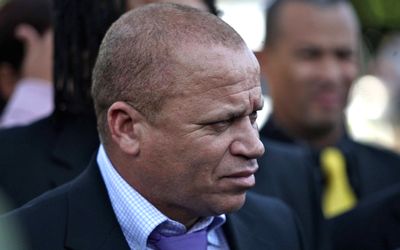A LETTER written by Beaufort West mayor Truman Prince has rapidly gained notoriety. Mr Prince has a knack for controversy, but it would be dangerous to dismiss his latest exploits.
He wrote to the Construction Education and Training Authority to query a competitive bid process to build a skills centre and insisted that companies that had a relationship with the African National Congress benefit so they could then support the party.
The letter raises serious questions about political party funding and its role in driving public sector corruption.
What Mr Prince put in writing is what is generally accepted in many municipalities across the country. It is also taken for granted by many seeking contracts in municipalities and provinces that they have to donate to the political party in control if they are to be considered favourably.
In other instances, business people who are not willing to show party loyalty have the payment of their invoices delayed unduly as punishment. Sometimes contract hopefuls are left with very little choice but to adorn their luxury cars with party paraphernalia to show loyalty, over and above their contributions.
Mr Prince’s letter has given the public some insight into a deep-seated rot. It also demonstrates how vulnerable emerging entrepreneurs are to crude rent-seeking, which has destroyed the prospects and dreams of those who refuse to play the game.
The public gets hurt and pays as this leads to inflation of prices so as to launder some of the payments towards party funding.
Sometimes who gets the contracts is determined solely by the likelihood of party funding, and not the best combination of quality and price.
This perverse system continues beyond elections, with political party coffers being replaced by the insatiable back pockets of senior bureaucrats and politicians. They either act in tandem or engage in squabbles that result in endless, spurious suspensions and, on some occasions, acts of violence. State-owned enterprises are a deep well of procurement contracts. Allegations of corruption where politically connected individuals and their companies appear to benefit are commonplace, and often involve very senior national political figures.
In the context of a tightening fiscal environment, the state must use all funds as prudently as possible. Corruption means the investment required in the economy suffers. Delays due to undeserving service providers cost money, while ordinary people and businesses that could generate much-needed employment suffer.
It also means that potentially successful businesses that could make a difference in the economy have to overcome added and artificial obstacles, while having to survive in tough times.
This opportunity cost is incalculable. It also perverts the value system a modern society needs, such as fairness and equal opportunity.
Under normal circumstances, we would call upon law enforcement agencies to pursue and prosecute those who engage in corruption — but that would be fruitless.
The police and the National Prosecuting Authority appear to have lost their appetite for pursuing politically driven corruption. Or maybe they lack the skills to do so. Either way, confidence in both institutions has long since waned and is unlikely to be regained anytime soon.
A disturbing trend is that some seeking the favours appear to be linked to very high office in SA. The frequency of the cases means the public has become inured, while the cancer spreads.
Although much will be said about Mr Prince, he’s merely a manifestation of a deeper ill. It is time South Africans realised that corruption will not end without seismic shifts in the political landscape.

Truman Prince. Picture: SUNDAY TIMES
A LETTER written by Beaufort West mayor Truman Prince has rapidly gained notoriety. Mr Prince has a knack for controversy, but it would be dangerous to dismiss his latest exploits.
He wrote to the Construction Education and Training Authority to query a competitive bid process to build a skills centre and insisted that companies that had a relationship with the African National Congress benefit so they could then support the party.
The letter raises serious questions about political party funding and its role in driving public sector corruption.
What Mr Prince put in writing is what is generally accepted in many municipalities across the country. It is also taken for granted by many seeking contracts in municipalities and provinces that they have to donate to the political party in control if they are to be considered favourably.
In other instances, business people who are not willing to show party loyalty have the payment of their invoices delayed unduly as punishment. Sometimes contract hopefuls are left with very little choice but to adorn their luxury cars with party paraphernalia to show loyalty, over and above their contributions.
Mr Prince’s letter has given the public some insight into a deep-seated rot. It also demonstrates how vulnerable emerging entrepreneurs are to crude rent-seeking, which has destroyed the prospects and dreams of those who refuse to play the game.
The public gets hurt and pays as this leads to inflation of prices so as to launder some of the payments towards party funding.
Sometimes who gets the contracts is determined solely by the likelihood of party funding, and not the best combination of quality and price.
This perverse system continues beyond elections, with political party coffers being replaced by the insatiable back pockets of senior bureaucrats and politicians. They either act in tandem or engage in squabbles that result in endless, spurious suspensions and, on some occasions, acts of violence. State-owned enterprises are a deep well of procurement contracts. Allegations of corruption where politically connected individuals and their companies appear to benefit are commonplace, and often involve very senior national political figures.
In the context of a tightening fiscal environment, the state must use all funds as prudently as possible. Corruption means the investment required in the economy suffers. Delays due to undeserving service providers cost money, while ordinary people and businesses that could generate much-needed employment suffer.
It also means that potentially successful businesses that could make a difference in the economy have to overcome added and artificial obstacles, while having to survive in tough times.
This opportunity cost is incalculable. It also perverts the value system a modern society needs, such as fairness and equal opportunity.
Under normal circumstances, we would call upon law enforcement agencies to pursue and prosecute those who engage in corruption — but that would be fruitless.
The police and the National Prosecuting Authority appear to have lost their appetite for pursuing politically driven corruption. Or maybe they lack the skills to do so. Either way, confidence in both institutions has long since waned and is unlikely to be regained anytime soon.
A disturbing trend is that some seeking the favours appear to be linked to very high office in SA. The frequency of the cases means the public has become inured, while the cancer spreads.
Although much will be said about Mr Prince, he’s merely a manifestation of a deeper ill. It is time South Africans realised that corruption will not end without seismic shifts in the political landscape.




















Change: -0.47%
Change: -0.57%
Change: -1.76%
Change: -0.34%
Change: 0.02%
Data supplied by Profile Data
Change: -1.49%
Change: 0.09%
Change: -0.47%
Change: 0.00%
Change: -0.02%
Data supplied by Profile Data
Change: 0.48%
Change: 0.90%
Change: 0.36%
Change: -0.15%
Change: 1.05%
Data supplied by Profile Data
Change: 0.23%
Change: -0.32%
Change: 0.26%
Change: -1.05%
Change: -1.41%
Data supplied by Profile Data